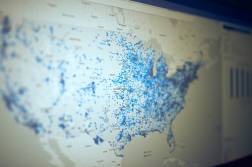National study names top states for data innovation

Whether the issue is energy, education, healthcare, transit or day-to-day office work, data determines the effectiveness of state government agencies. This is why, on Monday, the Center for Data Innovation (CDI) released a comprehensive study that outlines key metrics for data management and spotlighted Massachusetts, Washington, Maryland, California and Delaware as the top five states for data innovation.
The report analyzes 50 states using 25 data performance indicators across three categories that include data availability, enabling technologies and the human and business resources that propel data use in local communities and industries. Daniel Castro, the center’s director and report co-author alongside Josh New and John Wu, said the study is the largest the organization has ever conducted and is intended to provide states a framework to measure their data efforts. The report provides examples of the best performers to encourage state leaders and policy makers to champion data initiatives amid a growing trend by government to make decisions that are based on data.
“We saw there were certain states that are really thinking about these issues,” Castro told StateScoop. “They’re asking how can we participate more in the data economy, how can we use data better in government, how can we use data better for services while others are not having those conversations — or they’re trying to but lack the talent and resources to succeed in that area.”
The five lowest ranked states were South Carolina, Alabama, Louisiana, West Virginia and Mississippi. The main difference between top performing states and the rest, Castro said, is the presence of proactive leadership.
“Many times we’ve been asked what is the state of data driven innovation in the United States, and in trying to answer to this, we realized that there is a lot of variation in what goes on.” Castro said. “So we wanted to take a look and see if we could tease out the differences between different states.”
Governors, lieutenant governors, chief information officers, chief technology officers and chief data officers are named the primary catalysts in breaking down barriers and establishing data initiatives. Successful states also tied data policy to tangible problems and performance outcomes. In New York, which ranks 10th
On the center’s website, an interactive map of the U.S. identifies top states by category. Washington ranks highest for legislative data, Massachusetts is the highest for general energy usage, Delaware for building energy, Maine for smart meters, New York for electronic prescriptions. Each of these leaders show states how to improve services.
“Ideally what policymakers should do is go through each of the indicators and see where they’re behind and then look and see who’s ahead of them and what steps those states took to progress,” Castro said. “In every category there is something a state government can do to help themselves move forward.”
States have struggled to manage and disseminate education data properly, Castro said, yet this category has seen the most improvement across the U.S. Many states are laying the groundwork for reporting, yet the next step is for officials to make the data actionable at the school and classroom levels.
With the rise of evidence-based decision making in agencies, the center noted a growing need for digital infrastructure like broadband, analytics platforms, electronic health record systems, open data portals and Internet of Things (IoT). The environmental sensors of the budding Internet of Things industry, the report observes, will eventually provide a backbone to keep tabs on physical infrastructure and gauge the effectiveness of services.
Wealthier states like Utah, Virginia and Washington took the podium positions in this category, while states with rural communities typically lagged behind. Transportation, a key focus area for IoT projects, is the area states are excelling most overall, Castro said, with Ohio and Washington tying for first place in the category of transit information systems, closely followed by Alaska, ranked second.
“These [IoT] technologies can be used for many things, including monitoring roads and bridges, automating household appliances, monitoring health and fitness and improving agricultural efficiency,” the center wrote in the report. “These devices generate growing volumes of data that can be used for multiple purposes.”
The complete list of rankings and scores for states using data to innovate can be found here.






